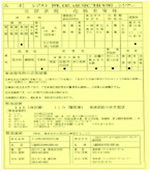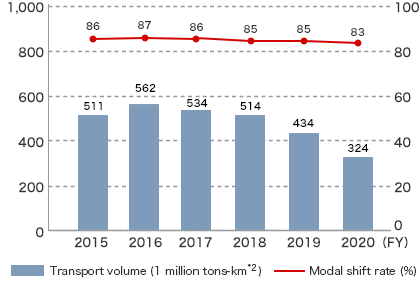SocietyLogistics
Cooperation that goes beyond JSR’s business establishments to include the entire supply chain is important in maintaining and improving the environment, safety, and quality in logistics. JSR Group makes various efforts to ensure the safe and environment-friendly transport of products.
1. Policy
Each year, JSR executes activities to manage risks and ensure safety after formulating a health and safety promotion plan at each plant based on the Philosophy and Course of Action for Occupational Health and Safety.
We formulate these plans based on actual results and issues from the previous fiscal year from the standpoint of the PDCA cycle and then implement activities with the aim of eliminating logistics and workplace accidents.
2. Safety Initiatives
(1) Identification and Improvement of Risks
We strive to improve the safety of our logistics sites by identifying potential sources of logistics/workplace accidents for both people and infrastructure―such as hazardous operations and locations within worksites―and making improvements. One way we do this is through regular patrols by managers.
(2) Cultivating and Spreading Safety Awareness
We provide hazard prediction training (KYT) to raise awareness of potential risks without carelessness or overconfidence, even in routine and familiar tasks, and improve sensitivity to hazard prediction. We also broadly solicit safety slogans from logistics partners to cultivate and instill safety awareness in each worker.
(3) Enhancing Education and Training
We provide preventive education based on a horizontal approach to logistics accidents and workplace accidents that incorporates examples from other companies. We also conduct various drills jointly with our logistics partners that simulate crises, such as large-scale disasters and logistics accidents, to improve our ability to respond to crises and raise safety awareness. Whenever points requiring improvement arise after training, we enhance the quality of our education and training by revising crisis management manuals, incorporating improvements into subsequent training, and the like.
(4) Maintaining Transport Safety and Environmental Standards

Example of a Yellow Card
(5) Reinforcing Health and Safety Collaboration with Logistics Partners
We share logistical challenges concerning quality, safety, and the environment and manage the progress of improvement activities by holding quarterly meetings with logistics partners through our logistics subsidiaries. We also verify, assess, and guide health and safety activities by conducting annual audits of our logistics partners.
3. Accidents and other Incidents in JSR Corporation (FY2020)
Logistics-related workplace accidents: 0
Traffic accidents resulting in injury to others: 0
Traffic accidents resulting in injury to JSR employee: 0
4.“White Logistics”-Related Initiatives
JSR endorses the “White Logistics” Movement being advocated by the Ministry of Land, Infrastructure, Transport and Tourism (MLIT); the Ministry of Economy, Trade and Industry (METI); and the Ministry of Agriculture, Forestry and Fisheries (MAFF) of Japan. We submitted a voluntary action declaration for the movement and are currently engaged in the following activities.
The movement seeks to improve productivity and logistics efficiency in truck transportation and create work environments in which female and elderly drivers can work comfortably. In doing so, its goals are to address ever-worsening truck driver shortages, to bring stability to the logistics services needed in daily life and industrial activity, and to contribute to economic growth.
One focus of our efforts under the movement is the diversification of transportation methods to bring about a model shift toward ships and railroads. We have achieved a high modal shift rate exceeding 80%―reaching 83% in FY2020―and are thus helping reduce carbon dioxide emissions through more efficient logistics. Through activities such as this, we aim to reduce the burden on drivers and reduce environmental impact by achieving a modal shift. We are also taking earnest steps to maintain fair and equitable business relationships with logistics operators while building a supply chain that does a better job of taking the environment and society into account.
* Written in Japanese
Initiatives undertaken by JSR Corporation
| Item | Description |
|---|---|
| Proposing and cooperating in logistics improvements | Whenever our business partners or logistics operators present proposals to reduce the burden on drivers and workers or streamline logistics, for example, we discuss those proposals with sincerity and proactively offer our own ideas. |
| Use of pallets, etc. | We aim to reduce drivers’ workload and shorten cargo-handling time by using pallets for transportation. |
| Separation of non-driving tasks | Whenever we are approached by a transportation company about non-transportation tasks performed by drivers, we engage in earnest discussions with the company to resolve the issue. We also proactively reach out to transportation companies and strive to grasp what is happening at the ground level. |
| Modal shift to ships and railroads | We aim to reduce environmental impacts by promoting a modal shift from truck transportation to ships and railroads. |
| Use of written transport contracts | We promote the use of transport contracts prepared in documentary form. |
| Safety measures during cargo handling | When carrying out cargo handling, we put safety first by implementing such measures as clearly indicating safe work procedures and installing scaffolding. We also strive to eliminate workplace accidents and achieve a safe work environment by identifying the sources of danger and hazardous operations and constantly conducting educational activities using Kiken Yochi Training (KYT). |
| Reducing long-distance transportation | We shorten the transport distance per trip and alleviate the workload on drivers in long-distance truck transportation by using ships and railroads and setting up stock points. |
Achieving a modal shift in JSR Corporation*1

*1: Transport volumes and modal shift rates for products and raw materials transported and delivered from JSR Corporation’s own warehouses and contracted outside warehouses to specified destinations in Japan
*2: Ton-km: [Cargo weight (tons)] x [transport distance (kilometers)]
See ESG Data for CO2 emissions associated with logistics.






